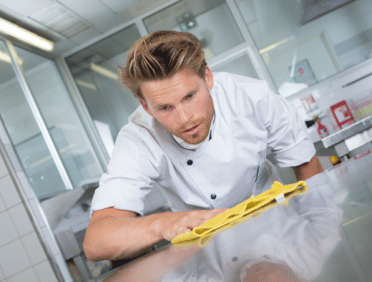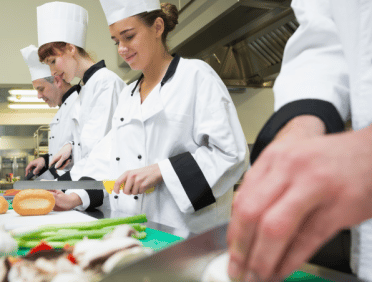Preparing for a food hygiene safety inspection is a vital part of everyday business. The objective is to do well, so it’s important to take several steps to guarantee the overall efficiency of the business at this time. You have an obligation to make sure that you prepare for the inspection to the best of your ability to ensure your business receives satisfactory results during the inspection. Thankfully, this is not particularly difficult to do and tends to have a high success rate for employers who prepare in advance.
It’s important to recognise the food hygiene rating is a valuable piece of testimony from the local authority but also a legitimate way to gauge the overall hygiene of your property and business.
You receive the food hygiene rating from a representative of the local authority. You will receive a score as a certain number of points, and then also a number between one and five. Each number relates to a different score in the ranking system.
Let’s take a look at each score individually:
If your food hygiene rating is 0, then you have received more than 50 points of issues, and urgent improvement is required.
If your food hygiene rating is 1, that means you have received between 45 and 50 points, and significant improvements are necessary.
If your food hygiene rating is 2, you have received between 35 and 40 points, and improvements are still necessary.
If your food hygiene rating is 3, you have scored between 25 and 30 points, and this is considered to be a satisfactory score. This is the minimum requirement for safe operation.
If your food hygiene rating is 4, that means you have scored 20 points, and your business has been rated as good. Minimal changes in all areas of improvement have been identified.
If your food hygiene rating is 5, your score is between zero and 15 points. This is the highest score you can receive as part of the food hygiene rating and is what every business should aim for.
Businesses will receive an official written assessment within 14 days that details why they have received the rating they have. This helps businesses to make changes or maintain their high standards.
What is an EHO Inspection?
The EHO inspection is an inspection conducted by an environmental health officer. They monitor different types of health and hygiene, and will perform inspections of any business that serves food regardless of size.
The thing to remember about an EHO inspection is that they will turn up at any point with no warning and will be inspecting the premises to make sure that the correct standards of hygiene are being maintained on a regular basis.
Food Handling Practices
It’s important to maintain correct food handling practices to get the best ratings from inspections.
- You need to make sure that you clean your hands, counters, and cooking tools and wash food where necessary.
- You need to separate the different types of foods, keeping raw food to itself at its own station.
- Food needs to be cooked until it is hot all the way through and then kept at a high temperature before being served.
- Any food that is chilled needs to be put into a fridge immediately to preserve the cold temperature.
Personal Hygiene
Personal hygiene standards need to be maintained throughout daily operations. Businesses need to be committed to delivering high standards of personal hygiene. This means that you need to make sure that your appearance is neat and tidy, your hair is tucked back, jewellery is removed, and appropriate clothing is worn.
A personal hygiene code should be designed by employers and followed by all employees.
You can download our free personal hygiene checklist by clicking here.
Food safety management often requires a considerable amount of paperwork and due diligence to be done. Businesses need to keep track of the health and safety policies that they have implemented and make sure that their records are kept up to date. In the event of a lawsuit by a customer or an inspection, the paperwork must be produced and be available for inspection at any point.
Food Storage
Food storage needs to take place according to individual needs and requirements. Obviously, there is the expectation that businesses should comply with legislation regarding food storage. There needs to be suitable space to store different types of food in separate places at the required temperatures.
Staff should be educated on the importance of food storage and have sufficient training to store food in a safe, hygienic fashion. Any food that is too hot or heated through must be allowed to cool down completely before being stored.
Businesses have a legal requirement to develop proper allergen controls to protect customers from the risk of allergic reactions.
The most common sources of allergic reactions are milk, eggs, peanuts, shellfish, shellfish, tree nuts, and some fruits and vegetables. Any product which is sold as pre-packaged needs to have these labels adequately reflect the potential allergen concerns, as well as highlight in bold any ingredients that may cause allergic reactions. Menus need to be designed with allergens clearly listed.
Temperature Control
Proper temperature control helps to ensure that food that is meant to be served hot is kept at a required temperature, and food that is meant to be served cold is not left out at a dangerous temperature to prevent it from defrosting or becoming too warm.
Heat is one of the best ways to kill bacteria, as well as rapid temperature changes, which help to destroy bacteria, such as heating cold food.
Structure and Cleaning
When it comes to developing a proper cleaning structure, it is at the discretion of the employer to create a cleaning schedule which has been designed to comply with legislation and is something staff can feasibly achieve with their current level of training.
General cleaning tips should be followed. Work surfaces need to be kept easy to keep clean and disinfected at a moment’s notice. Any surface in the kitchen environment should be made of non-toxic materials, and be washable and smooth. Unsealed wood is not an acceptable material to use in a kitchen environment.
Food Rooms and Equipment
When it comes to food rooms and equipment, an inspection will mandate that certain standards are maintained.
The food premises must be clean and kept in good condition. A food room must be constructed and made using materials that are considered to be both non-toxic and suitable for regular cleaning. Any equipment used by staff must be fit for purpose, easy to clean, and in compliance with health and safety legislation.
There must be an adequate number of wash basins and areas for staff to maintain personal hygiene standards. Any bathrooms that are used by staff or customers must not directly lead into food preparation areas. There must also be suitable airflow into the building.
Cross Contamination Controls
Cross-contamination is a common issue in busy restaurants, especially during rush hours. Therefore, adequate cross-contamination controls must be put in place to protect customers from harm. There must be proper cleaning procedures in place to make sure cross contamination does not occur, and raw food must be prepared in a unique station away from other types of food.
Pest Control
Proper routine and policy must be followed in the event of a pest control situation. Staff must be made aware of an immediate threat to hygiene standards as a result of pests. The relevant authorities need to be contacted to resolve the problem, and the entire situation must be adequately recorded and logged for due diligence purposes.
Appropriate steps must be taken as soon as possible, and if the threat of pests presents an immediate danger to food hygiene, the business must temporarily cease operations.
Waste and Laundry
All waste products in the business must be disposed of with the correct procedure. Staff must dispose of food waste as soon as possible and make sure to wash their hands after interacting with waste products. Any other waste must also be disposed of quickly, and proper hygiene should be observed afterwards.
Laundry should be done on a regular basis to prevent the risk of cross-contamination or disease as a result of dirty uniforms. Any laundry done must be compliant with food hygiene legislation and allow staff to follow the personal hygiene code laid out by regulations.
Businesses have a legal responsibility to keep adequate records of their activities. This means that our business is under obligation to keep a record of personal hygiene codes and health and safety inspections and to note what measures have been put in place to guarantee food hygiene safety.
In the event of a problem or the development of a health and safety code violation, all information relating to the incident must be logged and recorded. Any corrective measures taken must be noted, and their effectiveness should be reviewed and recorded at a later date.
To download a .pdf of this blog, please click here













